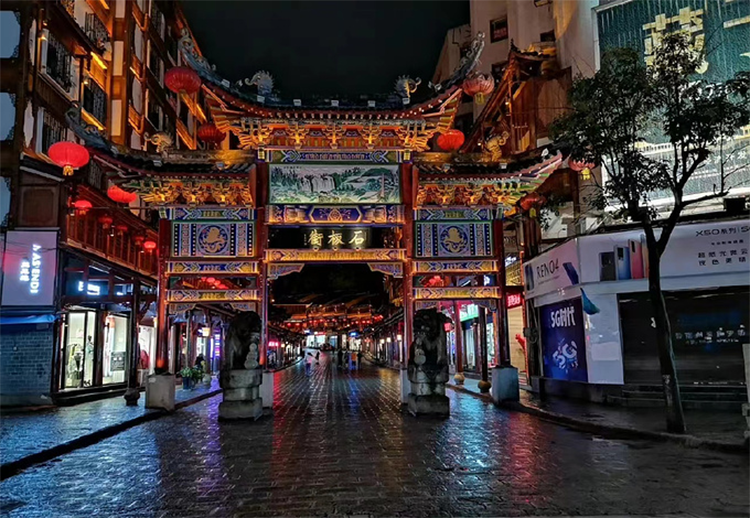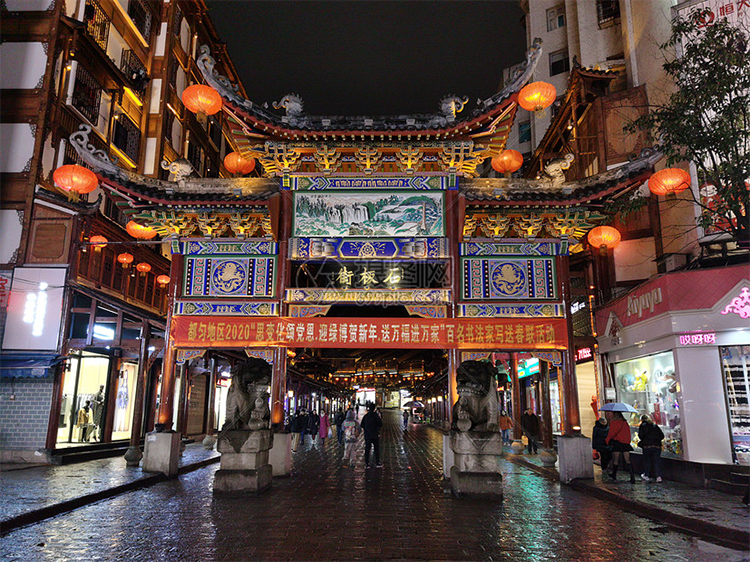Taste Sour Soup Fish on Duyun Walking Street: Ethnic Culture & Nightlife
Introduction:
When evening falls and lanterns along Jianjiang Middle Road light up while the reed-pipe melodies drift from the corners, you know you have arrived at Duyun Walking Street. This 800-meter pedestrian strip is not only the busiest commercial artery of Qiannan Prefecture but also a living ethnic tapestry: Miao embroidery and silver flash in shop windows, the scent of sour-soup fish fills the air, and costumed performers may break into joyful dances at any moment. Here you buy more than goods—you take home a piece of Dong and Miao-flavored city memory.
1. Soul Positioning: Crossroads of Ethnic Traditions and Modern Life
“Wearable epics” and “Qiannan on the tongue” collide here. As the city’s living room, the walking street follows a concept of “ethnic elements made fashionable”—traditional batik and indigo prints remade into trendy T-shirts, Miao silver-smithing techniques adapted into modern jewelry, and even chain restaurants hanging Dong-style patterned lanterns. This eclectic mix reveals the mountain peoples’ inclusive wisdom: preserving roots while embracing trends.
2. Shopping Guide: From Intangible Heritage Crafts to Authentic Local Goods
• Must-buy local finds:
– Miao treasures: “Qian Embroidery Studio” hand-embroidered tote bags (about RMB 200–500) use traditional plant dyes; every motif is a centuries-old auspicious symbol. “Silversmith Family” forges silver jewelry on-site and can customize name pendants (around RMB 80 per gram).
– Wild flavors: “Sour Soup Story” sells portable packets of red sour-soup base (RMB 15 per bag) to take the taste of Qiannan home; Buyi herbal shops offer mugwort neck pillows (RMB 60) good for office workers.
– Affordable fashion: Local brand “QianYan” tie-dye sweatshirts (from RMB 129) target young shoppers; the second-floor clearance often has items at 30% price or more.
• Shopping tips:
– Craft shops cluster in the street’s midsection, the “Ethnic Flavor Zone.” Look for stores with the “Intangible Heritage Workshop” copper plaque for more reliable quality.
– The Saturday morning “Mountain Produce Market” (west side of the street) sells farmer-supplied dried Rosa roxburghii, traditional candies and more—expect to haggle 10%–20%.

3. Foodie Fiesta: Tangy, Spicy, and Fresh Street Flavors
Checklist:
– “Wang’s Siwawa” (approx. RMB 25 per person): ultrathin rice wrappers filled with a dozen small side dishes, topped with a secret sour-spicy sauce. Locals insist on rolling by hand for the authentic experience.
– “Long Table Sour-Soup Fish” (approx. RMB 60 per person): river fish cooked in wild-fermented tomato red sour soup, served with chili dipping sauce; the second-floor terrace overlooks the street.
– Hidden gem: Alley stand “Grandma’s Tofu Balls” (opens around 3pm) sells freshly fried tofu balls—crispy outside, tender inside—RMB 3 each. They sell out fast.
Rest spot recommendation: “Tea Talk Qiannu” teahouse (prices from RMB 18) serves cold-brew Duyun Maojian tea; the bamboo-seat upstairs area is ideal for people-watching.
4. Immersive Experiences: Music, Night Scenes and Alley Adventures
• Live ethnic atmosphere:
– Free folk dance and music shows take place at Tonggu Square every Friday and Saturday at 7pm (canceled in rain). After the show, you can rent Miao ceremonial outfits for photos (RMB 20 per set).
– Nine shops offer “Intangible Heritage Experience Classes” by reservation: wax painting, traditional papermaking, etc. One-hour sessions cost about RMB 80 and you can take your work home.
• Nighttime magic:
The streetscape lighting projects Dong bridge motifs onto building facades. After 9pm, vendors roll out “late-night snack carts”—try grilled tofu fritters with Houttuynia dipping sauce (beware the spice!).

5. Locals’ Tips for Navigating the Walking Street
– Best times: Weekday mornings are quiet for photography; weekend evenings are lively—stagger meal times to avoid crowds.
– Hidden routes: Enter from the Baizi Bridge side entrance and follow a stone path to find the long-standing “Aunt Yang’s Sweet Fermented Rice”—RMB 5 a bowl, cooling and authentic.
– Pitfalls to avoid: Pre-cut fruit boxes at the entrance can be less fresh—buy whole fruit instead. Compare silver prices across three shops before buying.
6. Practical Information
Address: Jianjiang Middle Road, Duyun City (downtown—search “Duyun Walking Street”).
Opening hours: Shops typically 09:30–22:00; restaurants until 23:00; night stalls 18:00–24:00.
Transport:
– Bus: Routes 1/6/11 to “Dashizi” stop, 3-minute walk.
– Driving: Underground parking (RMB 5/hour, redeemable with minimum spend).
Payment: About 90% of shops accept WeChat Pay/Alipay; carry small cash for street stalls.

Conclusion:
Duyun Walking Street is a microcos of Qiannan—unpolished but energetic, modest yet full of stories of hills and people. Touch Miao embroidery, savor sour soup, listen to the reed-pipe echoes, and you’ll discover that this street is a key to unlocking Guizhou’s hidden charms.


